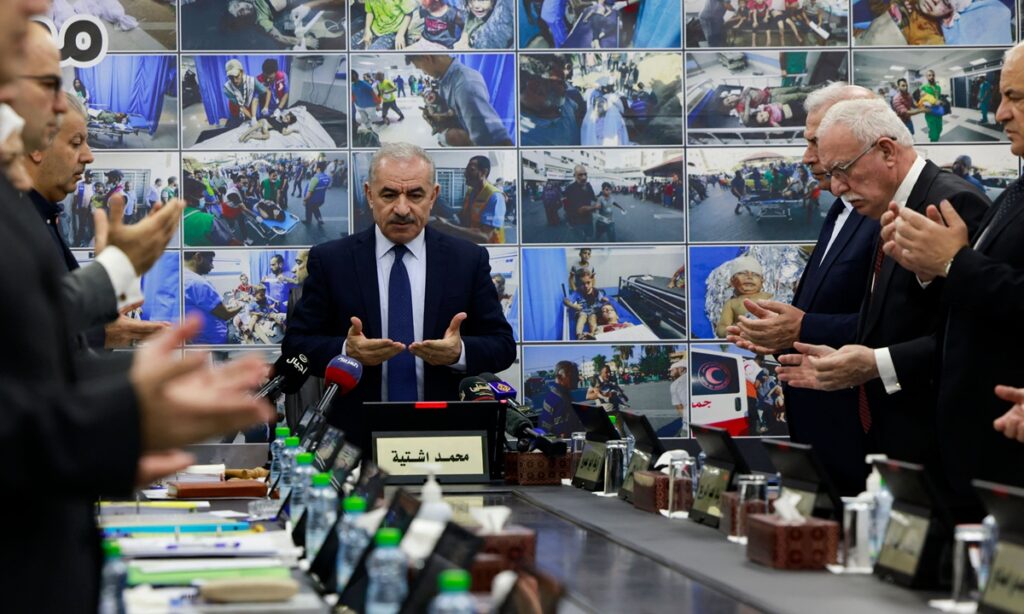With a looming Israeli ground invasion in Gaza and the catastrophic humanitarian crisis that the Palestinian people are facing, the Israel-Gaza conflict is escalating at a crucial point. Israel may not stop its military actions despite mounting pressure from the international community, and the battlefield between Israel and Palestine is now extending to diplomacy and public opinion, which will make the situation more complicated, analysts said, calling for the acceleration of mediation efforts to prevent the situation from getting worse.
The war has continued for 10 days after Hamas’ surprise attack against Israel on October 7. Israel’s military said Hamas’ attack has killed more than 1,300 people, and injured 3,200 others. In Gaza, the Health Ministry said Monday that Israeli airstrikes have killed at least 2,750 people and wounded at least 9,700, according to media reports.
China is providing emergency humanitarian assistance to the United Nations Relief and Works Agency for Palestine Refugees in the Near East and the Palestinian National Authority respectively, for the urgent needs of food, medical care and housing in Gaza, a spokesperson from China International Development Cooperation Agency said on Monday.
On Monday, Chinese Foreign Ministry spokesperson Mao Ning confirmed that four Chinese citizens died in the conflict, two are missing and six injured. Mao added that the operation of commercial flights between China and Israel continues and advised Chinese nationals to return to China as soon as possible. The ministry will provide convenience to Chinese people while closely monitoring the security situation and the situation of land and air travel, she said.
The crisis has reached a turning point as Israel reportedly plans to conduct ground operations in Gaza. Israel’s retaliatory actions have also alarmed the international community and more major countries have increased their efforts at mediation, Liu Zhongmin, a professor at the Middle East Studies Institute of Shanghai International Studies University, told the Global Times.
Liu predicted that Israel will take harsh action against Hamas in an effort to demonstrate its response to the group’s attack that left Israel with severest damages in decades.
The conflict is escalating as Israel is currently adopting a more aggressive offensive policy, which is to completely eradicate Hamas and prevent them from remaining in the Gaza Strip, Sun Degang, director of the Center for Middle Eastern Studies at Fudan University, told the Global Times on Monday.
Sun noted that Israel will have to bear the burden of international moral responsibility and increase the political cost of its military actions in the Gaza Strip. However, despite the pressure from the international community, Sun estimated that Israel’s military operations will not cease.
Moreover, if internal Palestinian divisions between Fatah and Hamas were to open up, the Israeli-Palestinian situation would become even more complicated, said Sun.
The international community has criticized Israeli for causing humanitarian crisis and refugee issues, Sun said. “Furthermore, some countries that previously supported or remained neutral towards Israel may also shift their attitudes,” he said.
The situation is becoming worse. Despite the fact that a schedule for a ground operation has not been disclosed, Israel has been reportedly massing troops along the Gaza border. As Israel ordered 1.1 million Palestinians living in the region’s north to move to the south and UN agencies issued dire warnings about a catastrophic calamity, more heartbreaking images have been covered by the media.
According to Liu, growing support for the Palestinians also reveal growing concerns about the dim future of the conflict because it is difficult to predict when Israel will cease.
The military battles would continue, and the situation would be more tense and contentious and greater efforts would be made to establish moral superiority, with both Israel and Palestine engaging in diplomatic efforts to gain sympathy or support, said Liu.
The risk for an escalation exists, Tian Wenlin, a research fellow at the China Institutes of Contemporary International Relations, told the Global Times. Although the main conflict took place in the Gaza Strip, there are some militant anti-Israel groups in the West Bank, and if they decide to launch an attack on Israel together, the fighting will spread. The war fire will also grow if new parties, like Syria and Lebanon, are drawn into the fight, said Tian.
A source with knowledge on escalating Israel-Palestine conflicts told the Global Times on Monday that the goal of Israel’s military operations is to eliminate Hamas and to make sure that it will not govern Gaza anymore.
“For now, I don’t think the ceasefire or peace talks is on the table until Hamas will be eliminated,” the source said.
With the spillover effect of the Hamas-Israel conflicts affecting Israel-Lebanon and Israel-Syria borders, the source said Israel is not wanting to create another front in the West Bank with any other political branches of the Palestinians. However, there is a risk if there is another front, Israel would need to deal with another front that might affect other countries in the Middle East.
Split widens
The prolonged conflict between Israel and Palestine has increased divisions both inside and between the US and the EU, analysts said.
In response to the deteriorating situation in the Gaza Strip, citizens of numerous European nations and in US colleges demonstrated in the streets for the past days. Also, Ursula von der Leyen, the president of the European Commission, has been under criticism for the past days for an omission of international law when showing support to Israel’s “right to defend itself,” according to media reports.
Sun noted that Europe is very concerned that the current protests may lead to increasing tensions or even conflicts between the Muslim population and pro-Israel forces within their own countries, as well as polarization within the European public opinion sphere.
“While Europe is politically supportive of Israel, it also fears that if Israel’s military actions escalate, it could lead to a spill-over effect, meaning the Israeli-Palestinian conflict spreading to Europe,” Sun said.
Liu noted that the longer Israel maintains its military operations in the Gaza Strip, the more the EU’s position toward Israel would increasingly diverge from US’, with more sympathy being shown for Palestine. Moreover, the EU has another serious concern — if two to three million people are displaced in the Gaza Strip, the refugee situation in the EU will become worse.
On Sunday, the CBS news released an interview with US President Joe Biden, in which the US President said “Israel has to respond. They have to go after Hamas,” but warned that an Israeli occupation of Gaza would be “a big mistake.”
In response to the latest remarks of Biden saying that Israel occupation of Gaza would be “big mistake”, the source said the occupation of Gaza is not the goal.
The US is more or less contradicting itself in handling the situation. On the one hand, the US does not want the conflict to escalate, which is why the top US diplomat has been busy meeting with regional nations for the past week. On the other hand, the US still needs to show support for Israel, especially on the diplomatic front, while such a stance and some of the US officials’ remarks could also incite Israel to seek retaliation, said Liu.
Tian said that the outbreak of the conflict serves as a further proof of the complete failure of the US policy in the Middle East as it attempted to achieve the goal of regional reconciliation but having biased favoring toward Israel.
Sun noted that currently, neither side is prepared for the outbreak of the sixth Middle East war. However, if the conflict between Hamas and Israel escalates in the Gaza Strip, and more parties are forced to get involved, “the conflict will spread and become a regional war between nations.”
Therefore, the international community should expedite mediation efforts to prevent the situation from escalating and spilling over, the expert noted.
The Palestinian issue cannot be solved by condemning one party at a certain time. China has always emphasized that it is necessary to see the complex historical context of the matter, rather than simply choosing sides to solve the problem, analysts said.
Special Envoy of the Chinese Government on the Middle East Issue Zhai Jun will be visiting the Middle East this week. Mao Ning, the spokesperson of the Foreign Ministry, said that the purpose of Zhai Jun’s visit is to gather consensus from the international community, urge relevant parties to cease fire and violence, and promote a cooling down of the situation, in order to create necessary conditions for a political resolution.
(Global Times)




